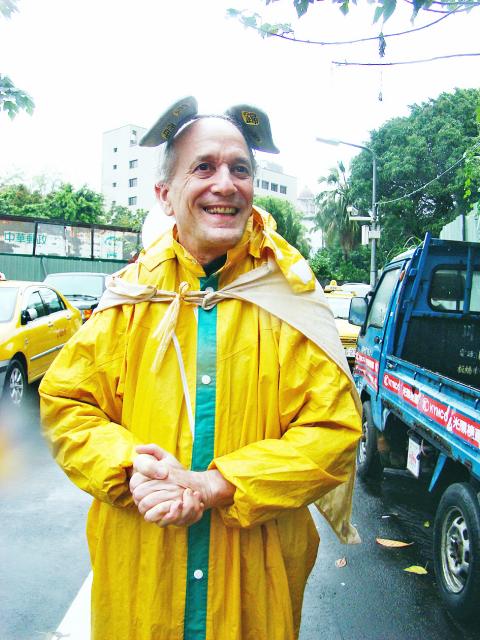Wild at Heart Legal Defense Association founder Robin Winkler yesterday announced his bid to run in the legislative election next year.
Born in the US, Winkler, 60, has lived in Taiwan for more than 30 years and is now a naturalized Republic of China citizen.
Winkler said the problems he sees in the economic, social and natural environments motivated him to run, adding that he believes politics is one of the best ways to make a contribution to society.

Photo: Chen Yen-ting, Taipei Times
A long-time environmentalist, he said that his main objective would be to push for strict implementation of the Basic Environmental Act (環境基本法), thereby helping the nation to become a nuclear-free homeland.
Calling himself a “relatively fortunate person throughout his life,” he said he would also like to address a range of social issues, including distribution of wealth, gender equality and Aboriginal rights.
He said the Indigenous Peoples Basic Act (原住民基本法) has been overlooked for a long time, which has caused Aborigines to receive unfair treatment.
Furthermore, he hopes to push forward an “open government” policy, as Taipei Mayor Ko Wen-je (柯文哲) did when he introduced the i-Voting system, to encourage civic participation in the government’s policymaking.
Winkler, a member of the Green Party Taiwan, said his bid for a legislative seat is in part due to a plan to help the party secure a seat at the legislature and obtain party votes, which translate into subsidies by the Central Election Commission.
He expects to be nominated as the Green Party’s candidate to run in the Shihlin-Beitou (士林,北投) constituency in Taipei this month.

Alain Robert, known as the "French Spider-Man," praised Alex Honnold as exceptionally well-prepared after the US climber completed a free solo ascent of Taipei 101 yesterday. Robert said Honnold's ascent of the 508m-tall skyscraper in just more than one-and-a-half hours without using safety ropes or equipment was a remarkable achievement. "This is my life," he said in an interview conducted in French, adding that he liked the feeling of being "on the edge of danger." The 63-year-old Frenchman climbed Taipei 101 using ropes in December 2004, taking about four hours to reach the top. On a one-to-10 scale of difficulty, Robert said Taipei 101

Nipah virus infection is to be officially listed as a category 5 notifiable infectious disease in Taiwan in March, while clinical treatment guidelines are being formulated, the Centers for Disease Control (CDC) said yesterday. With Nipah infections being reported in other countries and considering its relatively high fatality rate, the centers on Jan. 16 announced that it would be listed as a notifiable infectious disease to bolster the nation’s systematic early warning system and increase public awareness, the CDC said. Bangladesh reported four fatal cases last year in separate districts, with three linked to raw date palm sap consumption, CDC Epidemic Intelligence

Taiwanese and US defense groups are collaborating to introduce deployable, semi-autonomous manufacturing systems for drones and components in a boost to the nation’s supply chain resilience. Taiwan’s G-Tech Optroelectronics Corp subsidiary GTOC and the US’ Aerkomm Inc on Friday announced an agreement with fellow US-based Firestorm Lab to adopt the latter’s xCell, a technology featuring 3D printers fitted in 6.1m container units. The systems enable aerial platforms and parts to be produced in high volumes from dispersed nodes capable of rapid redeployment, to minimize the risk of enemy strikes and to meet field requirements, they said. Firestorm chief technology officer Ian Muceus said

MORE FALL: An investigation into one of Xi’s key cronies, part of a broader ‘anti-corruption’ drive, indicates that he might have a deep distrust in the military, an expert said China’s latest military purge underscores systemic risks in its shift from collective leadership to sole rule under Chinese President Xi Jinping (習近平), and could disrupt its chain of command and military capabilities, a national security official said yesterday. If decisionmaking within the Chinese Communist Party has become “irrational” under one-man rule, the Taiwan Strait and the regional situation must be approached with extreme caution, given unforeseen risks, they added. The anonymous official made the remarks as China’s Central Military Commission Vice Chairman Zhang Youxia (張又俠) and Joint Staff Department Chief of Staff Liu Zhenli (劉振立) were reportedly being investigated for suspected “serious